The growing use of the internet brings about a consistent state of concern among the majority of users in regard to their online safety. While no one is 100% safe, VPNs are one of the proven tools that promise safety against some of the most common cyber threats. As these VPN statistics reveal, the usage of these solutions has consistently been on the rise in recent years, especially during the COVID-19 pandemic. Read on to discover the latest state of the VPN industry, usage frequency, user habits and demographics, and more.
VPN Statistics – The Highlights
- 85% of adults know what a VPN is, and 41% use one for business or personal use.
- 62% of users associate VPNs with security.
- At 55%, general security is the most common reason for using a VPN.
- 68% of companies expanded their VPN usage as a result of the COVID-19 pandemic.
- Two out of three free VPN users report experiencing technical issues.
- Indonesia is the largest VPN market, with 55% of its internet users using one.
- 74% of internet users between 16 and 24 use a VPN.
General VPN Stats
1. When it comes to their personal data, 66% of internet users are concerned about cybercriminals/hackers.
Local government ranks second at 40%, followed by social media companies at 37%, foreign governments at 34%, and search engines at 32%. Another 28% are concerned about their internet service providers, 25% about email services, and equal 21% portions about retail sites and device manufacturers. Entertainment subscription services and employers are the main reason for concern regarding their personal data for 16% and 12% of internet users, respectively.
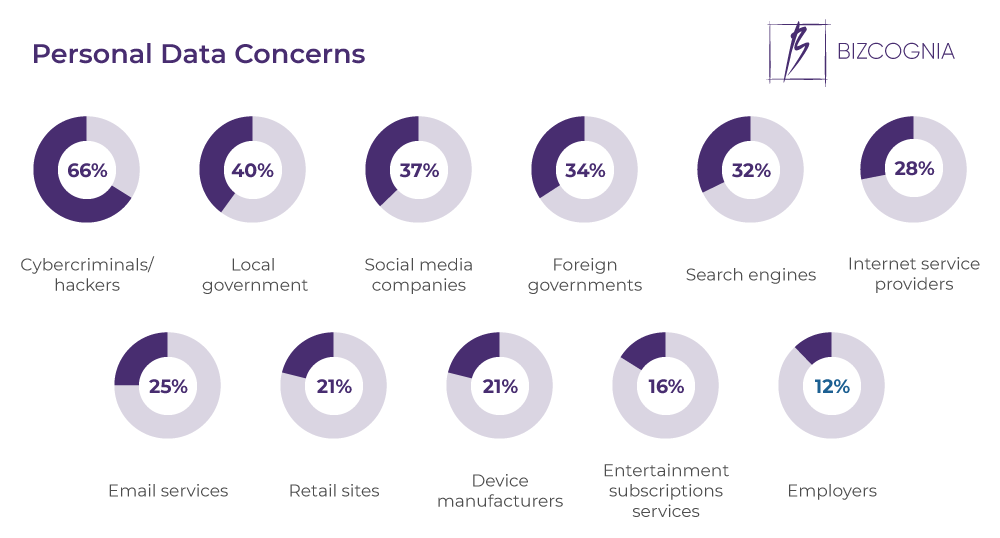
2. 75% of global internet users use at least one privacy tool.
As far as privacy tools, including VPNs, proxy servers, private browsing windows, ad blockers, and deleting cookies, 25% of internet users aren’t using any of them. 58% use two of them, 34% use three, and 16% use all four.
Regarding which of these privacy tools are most used, 54% of global internet users rely on private browsing windows, 51% delete their cookies, 48% use an ad blocker, and 31% use a VPN.
3. 85% of adults know what a VPN is, and 41% use one for business or personal use.
As of 2021, VPN awareness was up 18% compared to the previous year. On the other hand, usage dropped by eight percentage points from 49% recorded in 2020. The remaining 43% of adults know what a VPN is but don’t use one.
4. 62% of users associate VPNs with security.
VPN statistics further reveal that 54% associate VPNs with usefulness, 52% with safety, and 51% with effectiveness. 42% of users associate the word ‘necessary’ with VPNs, 26% with the word ‘legal’, 23% with ‘empowering’, and 10% with ‘confusing’.
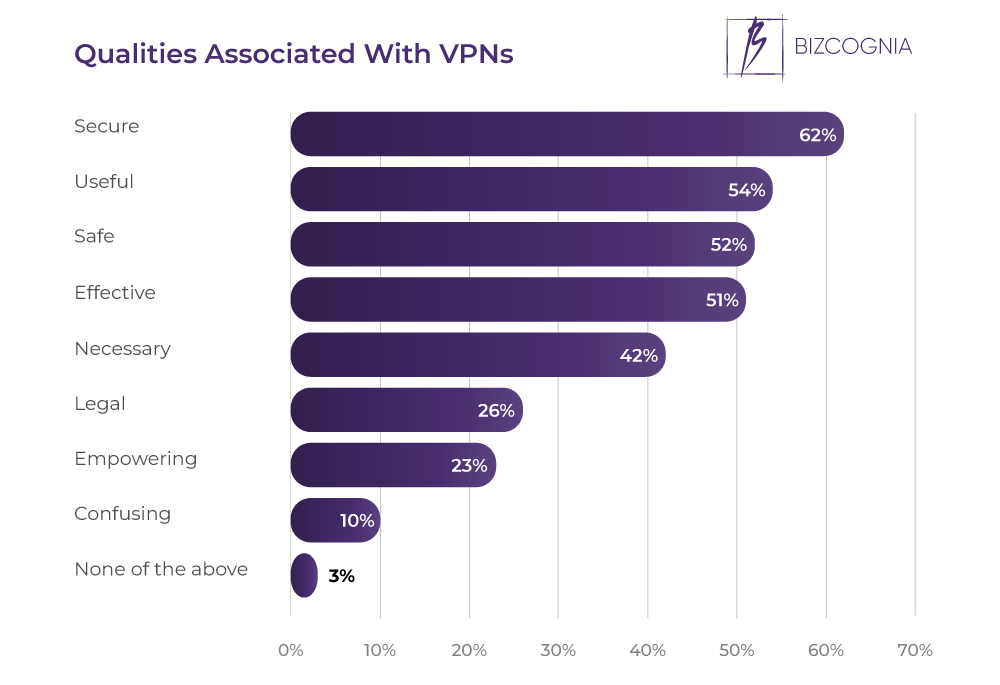
5. At 55%, general security is the most common reason for using a VPN.
General privacy ranks second at 54%, followed by accessing secure networks at work at 41%. VPN usage as part of job requirements ranks third with 38%, followed by using public WiFi without risks with 34%.
VPN use statistics further reveal that 24% of adults use a VPN for increased security during online shopping, while 23% do so to hide their internet activity from their ISP. Another 20% use a VPN to access content unavailable in their countries, which is where the best VPNs for streaming typically come in.
Hiding their activity from Google and other search engines is the reason why 18% of adults use a VPN, followed by torrenting with 13%, bypassing restrictions at school/work with 9%, and avoiding cache/cookies in order to save money when shopping online with 8%.
Equal 6% portions of adults use a VPN to bypass their governments’ internet censorship and secure their VoIP calls, 3% do so for work in research, whistleblowing, activism, or journalism, while 2% use a VPN for reasons other than the ones mentioned so far.
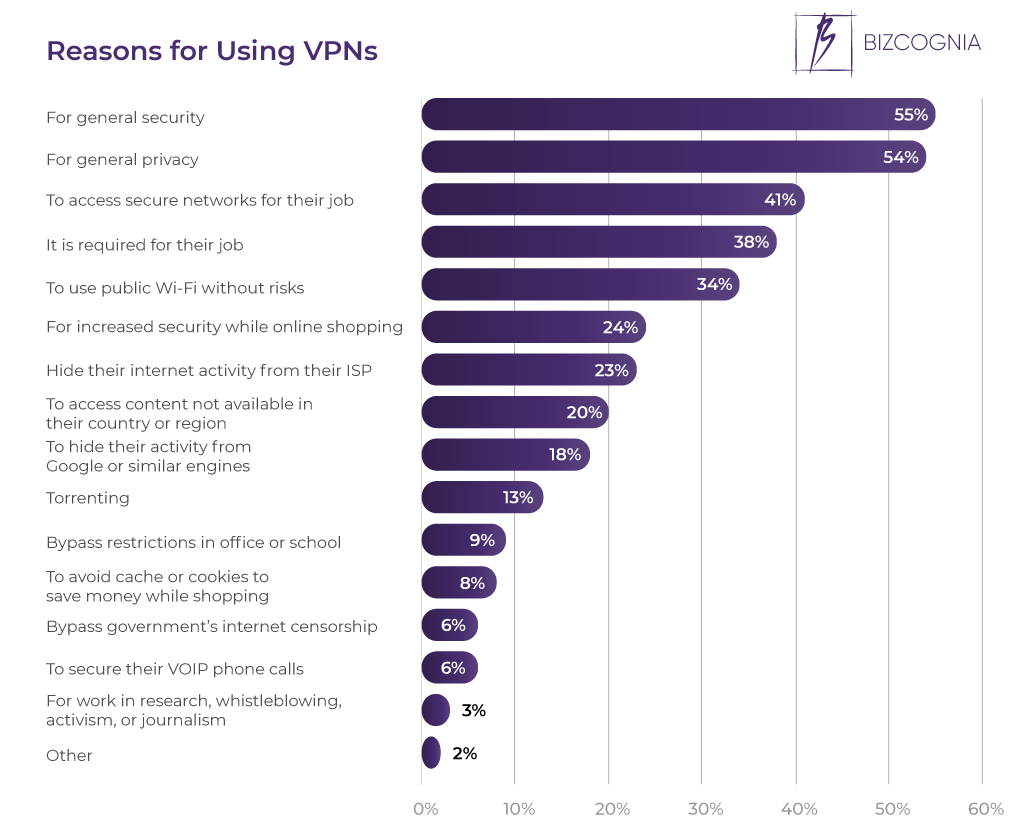
6. 54% of VPN users agree that speed, connection reliability, and ease of use are the most important factors when choosing a VPN.
Privacy policy, including logging practices, rank second as the most important factor for 43% of VPN users, closely followed by pricing with 42%. Advanced security features such as split tunneling are the most important factor for 30% of VPN users, closely followed by the number of server locations with 29%. Access to their favorite streaming sites and reviews by other users are important to 27% and 26% of VPN users, respectively, followed by torrenting/P2P with 23%, customer support with 21%, and free trials with 20%.
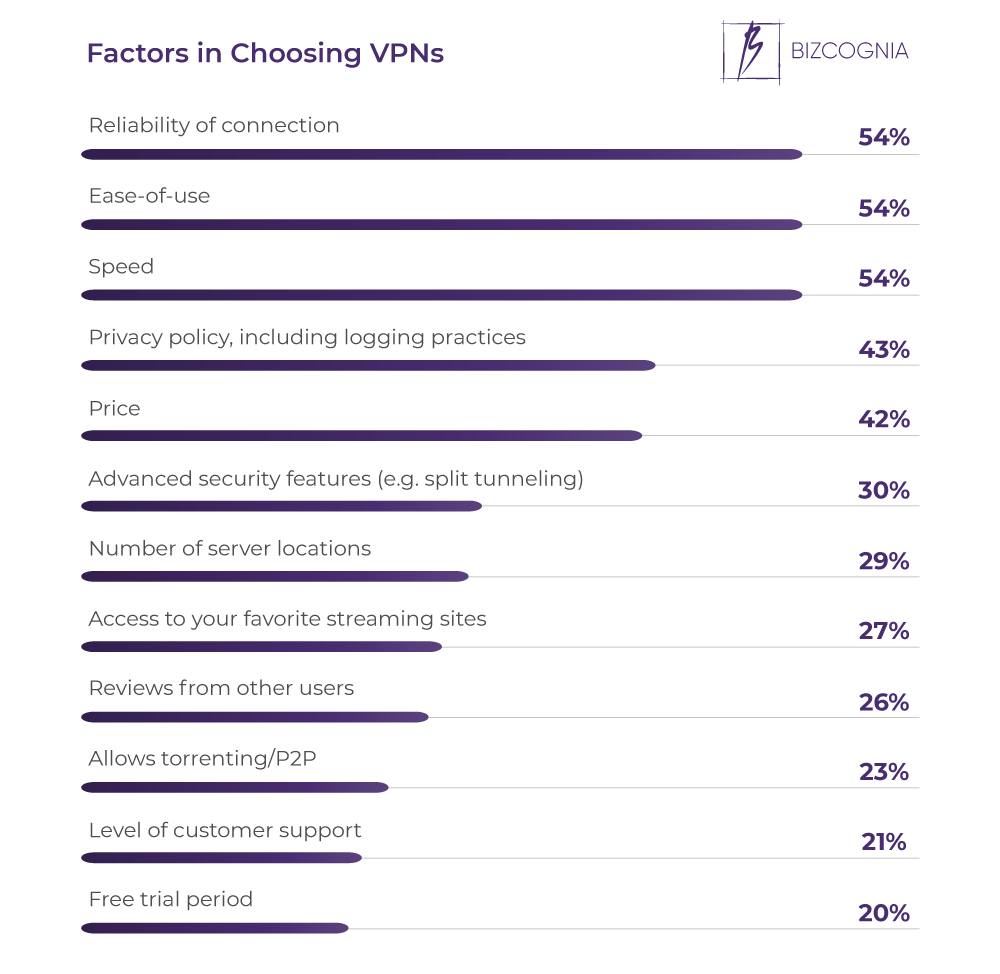
7. 56% of those who don’t have a personal VPN say they don’t need it.
As per VPN statistics, for 23%, it is too expensive, and among those who do use a personal VPN, 41% rely on a free service. Another 21% of those who don’t have a personal virtual private network service don’t understand the benefits of using a VPN. 17% find it difficult to set up, while 9% don’t use a personal VPN for reasons other than the ones mentioned so far.
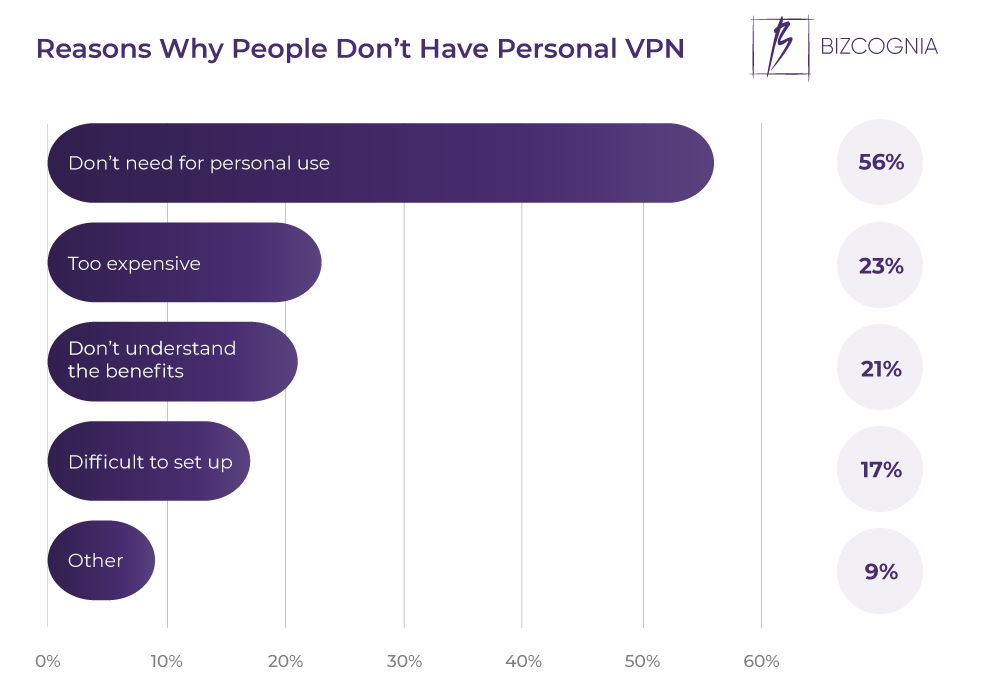
8. 68% of companies expanded their VPN usage as a result of the COVID-19 pandemic.
However, 21% have never used a business VPN, 71% of whose employees said that business VPN utilization was still neglected. While 29% were using business VPNs for the first time, an incredible 99% of employees said their companies would continue using these solutions after the pandemic is over.
VPN Usage Statistics
9. 72% of users rely on free VPN services.
Another 36% use paid VPN services. The figures don’t add up to a hundred, as users seem to rely on multiple solutions with different pricing models.
Among those who use paid VPNs, 54% say they do it to avoid data sharing with third parties. Another 47% to avoid performance restrictions, 42% to avoid targeted in-app advertising, and equal 41% to avoid data restrictions and limited privacy policy information.
Free VPN’s lack of transparency about ownership is the reason why 37% of users opt for a paid solution, and the same applies to general in-app advertising (35%), poor app design (28%), and service provider links to countries with little internet freedom (27%).
VPN statistics further reveal that 11% of users opt for a paid VPN just because they expect not to have the problems they would with a free one.
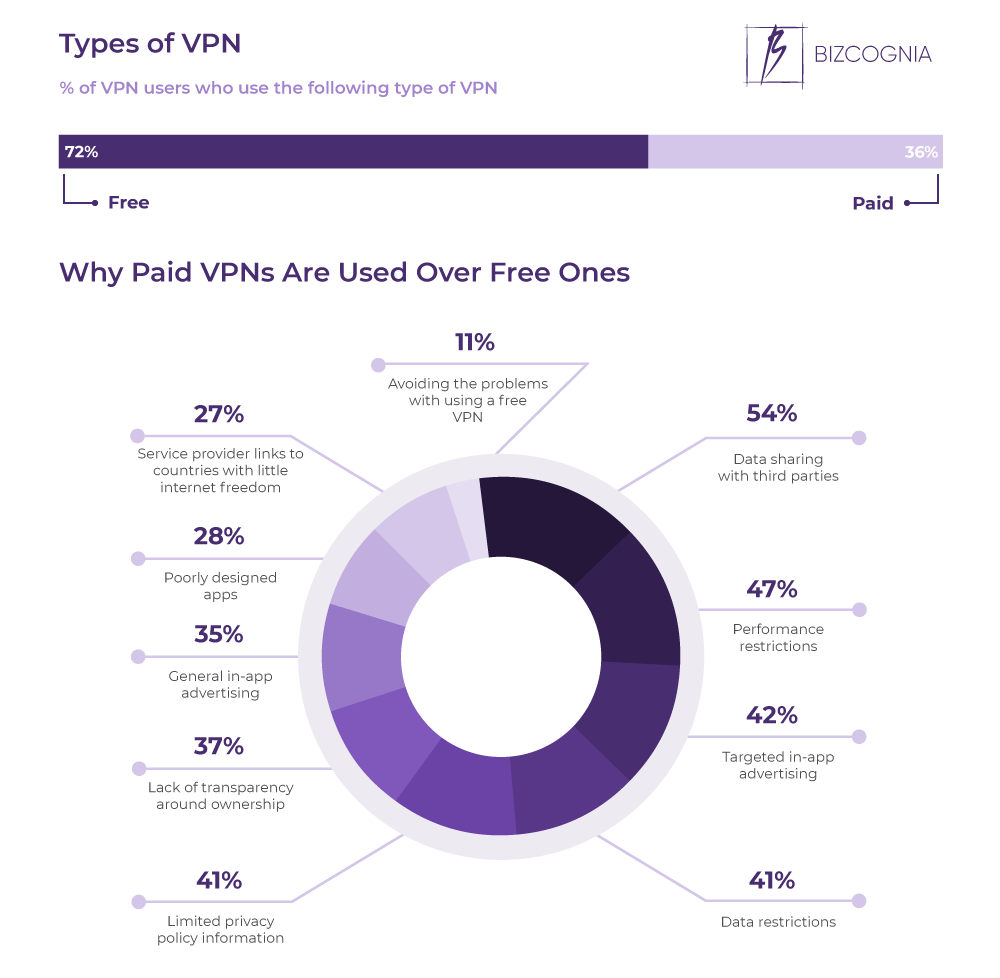
10. Two out of three free VPN users report experiencing technical issues.
At 56%, slow internet speed is the top technical issue that free VPN users report experiencing, followed by ad problems mostly related to their quantity or glitches at 25%. Streaming and/or torrenting problems are a technical issue faced by 18% of free VPN users, which can potentially be avoided by looking for VPN services specialized for torrenting. Depleted battery life and software bugs are technical issues reported by 15% and 14% of free VPN users, respectively.
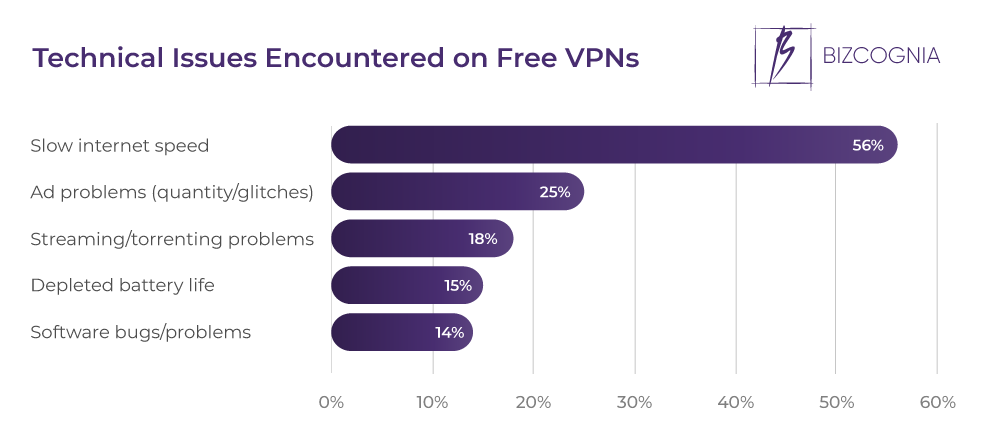
11. 81% of users use their VPNs at home.
VPN usage statistics reveal that 34% do so at cafes/restaurants, with workplaces closely behind at 32%, along with hotels at 31%. 28% of users use their VPNs at shopping centres or tourist attractions, 27% do so at educational institutions, 24% at airports/public transport, and 6% use their VPNs on other places.
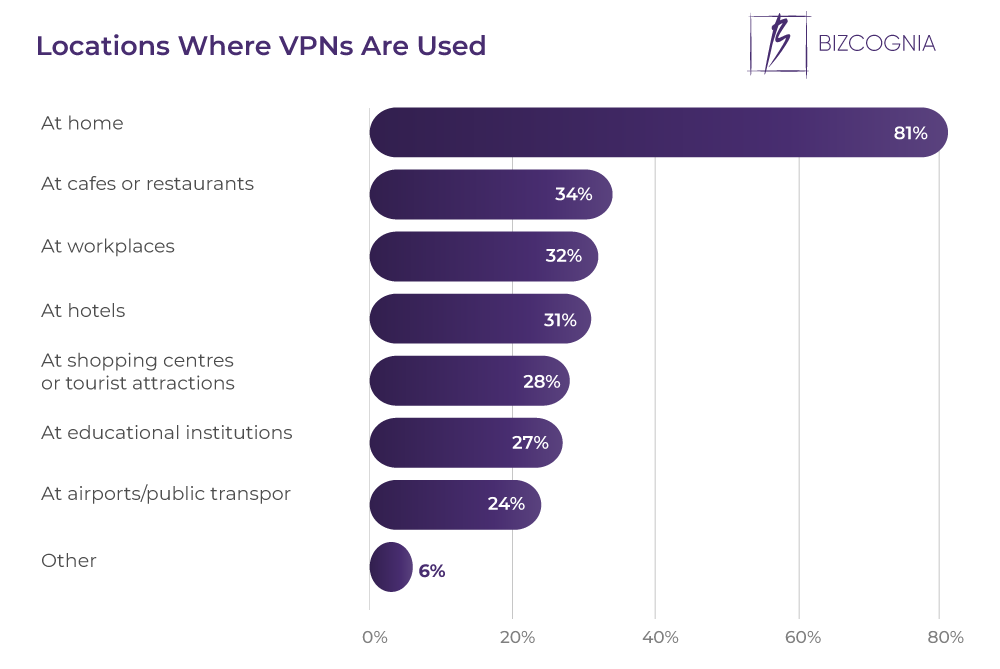
12. 32% of mobile VPN users use their VPNs (nearly) every day.
Those who use it 4-5 times a week rank second with 11%, followed by those who use it 2-3 times a week with 9%. 7% of mobile VPN users use their VPNs once a week, and 5% do so 2-3 times a month. While 4% use their VPNs once a month, 12% of mobile VPN users do so less often than that.
13. 29% of desktop VPN users use their VPNs (nearly) every day.
Those who use it 4-5 times a week rank second with 14%, followed by those who use it 2-3 times a week with 11%. 8% of desktop VPN users use their VPNs once a week, and 6% do so 2-3 times a month. While 5% use their VPNs once a month, 12% of desktop VPN users do so less often than that.
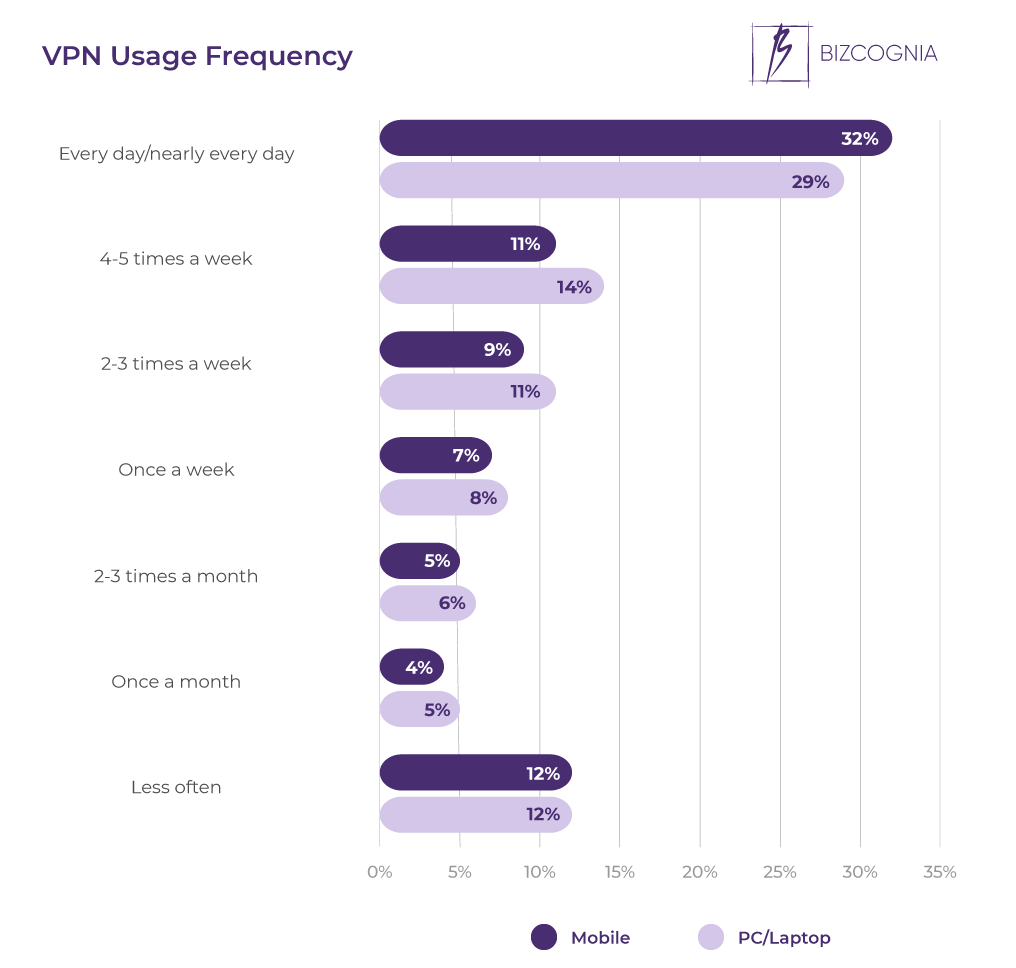
Statistics for VPN Usage Around the World
14. Indonesia is the largest VPN market, with 55% of its internet users using one.
India ranks second with 42%, followed by the UAE, Thailand, and Malaysia with 38% each. Saudi Arabia and the Philippines share the fourth spot with 37% each, followed by Turkey and South Africa with 36% each, and Singapore with 33% of its internet users using a VPN.
15. 65% of those who use a VPN in Malaysia do so to access better entertainment content.
The same applies to equal 64% portions of VPN users in the Philipines and Vietnam, followed by Thailand and Indonesia with 61% each.
57% of those who use a VPN in India do so to access better entertainment content, followed by South Africa and Romania at 55% each, Turkey and China at 54% each, Colombia and Taiwan at 52% each, and Mexico at 49%.
Accessing better entertainment content is the primary reason for using a VPN for 48% of users in Hong Kong, Ireland, Egypt, Brazil, and Saudi Arabia. Poland follows with 46%, and so do Singapore and Argentina with 45% each.
VPN statistics by region reveal that 43% of those who use a VPN in New Zealand do so to access better entertainment content, and so do 42% in Russia, 41% in Australia, and 40% in Japan. The same applies to equal 39% portions of VPN users in the Netherlands, Sweden, and South Korea.
Accessing better entertainment content is the primary reason for using a VPN for 38% of users in Spain, followed by the USA and Belgium with 37% each, and Italy with 36%.
16. 45% of those who use a VPN in France and Austria do so to keep their anonymity while browsing.
The same applies to 44% of VPN users in Germany, 42% in Canada, and 41% in Portugal. Equal 39% portions of those who use a VPN in the UK and Switzerland do so to keep their anonymity while browsing, followed by 35% in Denmark.
As agreed by 50% of VPN users there, communication with friends and family is the top reason for using a VPN in the UAE.
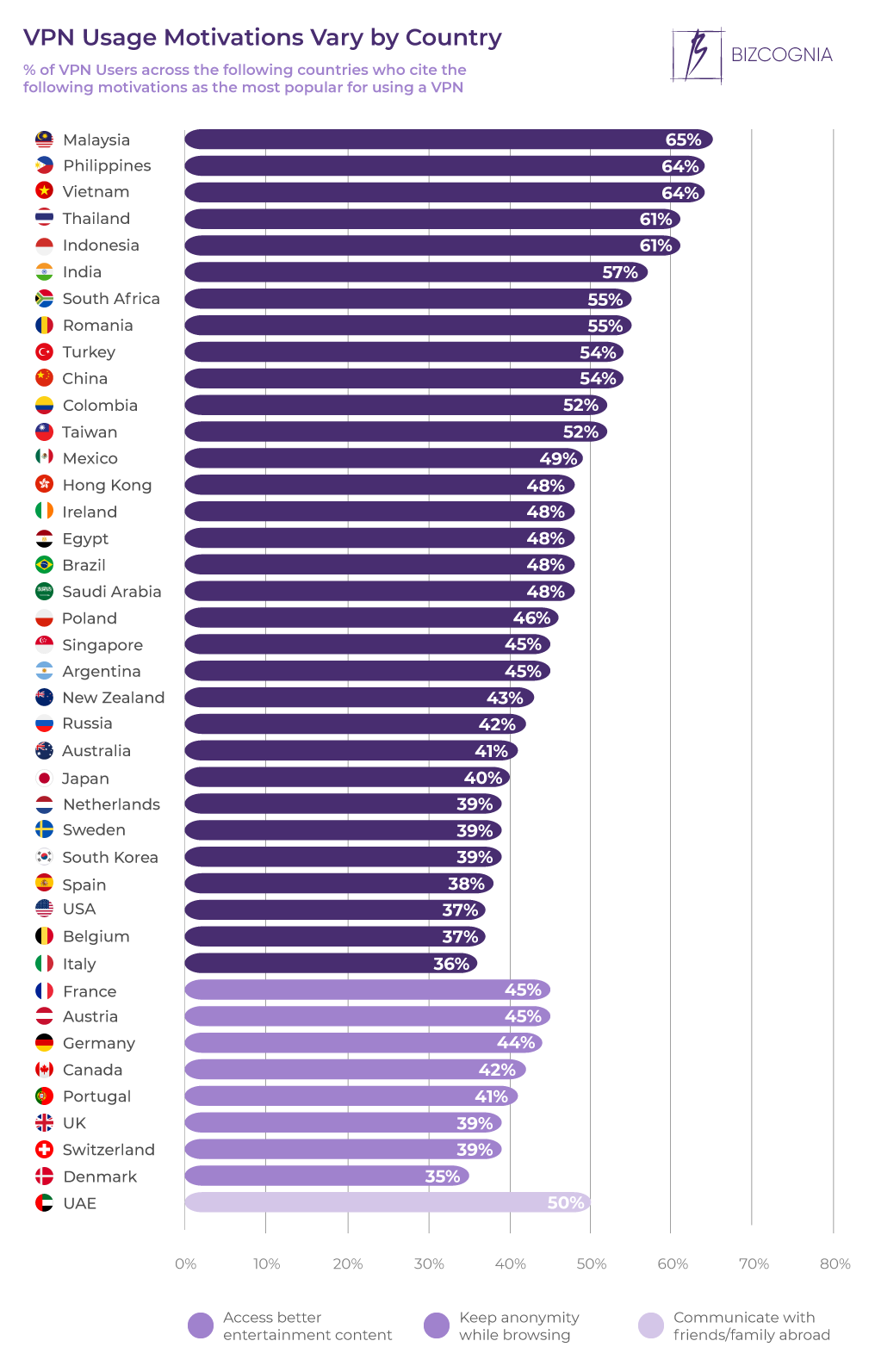
VPN Users Statistics
17. 34% of male internet users use a VPN.
The same applies to 25% of women.
18. 74% of internet users between 16 and 24 use a VPN.
The same applies to 67% of those between 25 and 34, 45% of those between 35 and 44, while equal 28% portions of internet users aged 45-54 and 55-64 use a VPN.
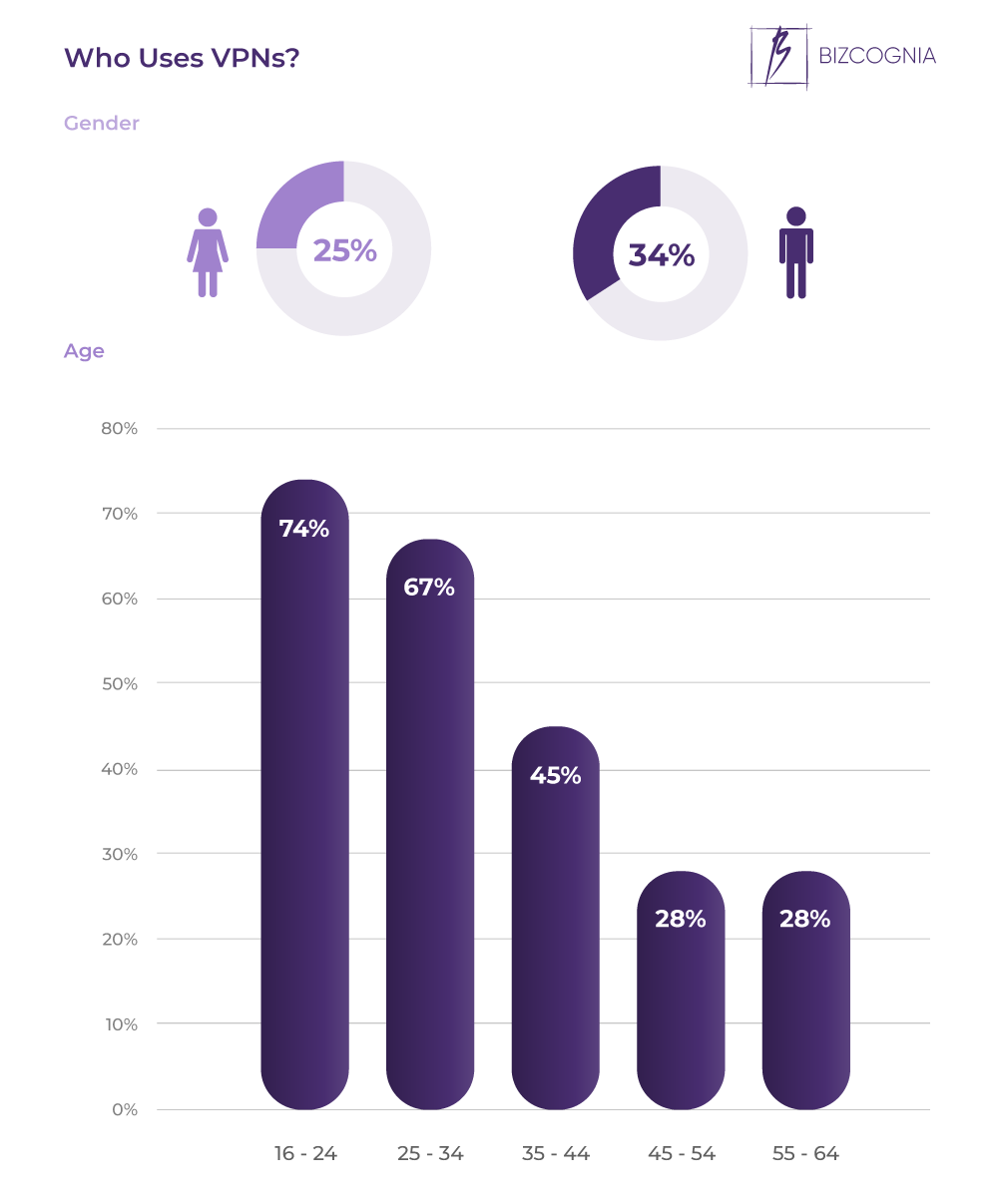
19. 64% of users use their VPNs on a smartphone.
Desktops/laptops are closely behind with 62%, followed by tablets (21%) and TV streaming sticks (14%), bringing about an emerging trend in the usage of dedicated solutions, such as Kodi VPNs. Another 10% use their VPNs on TV, 9% on game consoles, 8% on routers, and 2% on other devices.
20. 34% of VPN users are subscribed to a music streaming service.
VPN facts reveal that movie or TV streaming services rank second at 32%, followed by music download services at 30%, mobile apps at 24%, and mobile games at 23%.
21. 41% of VPN users see themselves using their VPN on an ongoing basis.
While the above data justifies the rising trend of lifetime VPN deals, the second-largest portion, or 26%, don’t know how long they’d use their VPN, and 8% estimate to use it for 3-6 months. Those who estimate to use for 6-12 months follow with 7%, and equal 6% portions estimate to use their VPNs for 1-3 months and 1-2 years. Only 4% of VPN users see themselves using their VPN for less than a month.
22. 56% of global VPN users also use Netflix.
VPN statistics reveal that the above figure further increases the demand for VPNs that work with Netflix, as opposed to ones good for streaming in general. Other TV/movie streaming platforms that VPN users subscribe to include Amazon Prime Video (23%), iQiyi (15%), Hotstar and YouKu (14% each), Sony Liv (12%), as well as NBA League Pass, Tencent Hollywood VIP, and Vimeo (10% each).
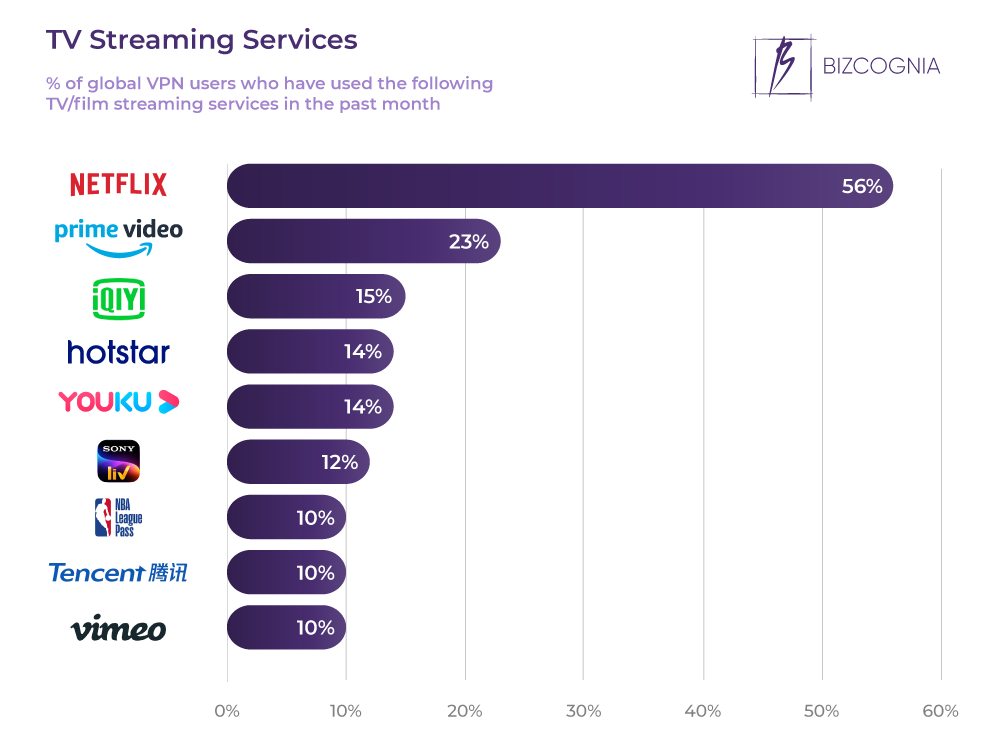
23. 36% of global VPN users also use Spotify.
The increasing popularity of this music streaming platform, brought about the introduction of VPNs that work with Spotify. Other audio streaming services that VPN users subscribe to include SoundCloud (17%), Apple Music (16%), QQ Music and Amazon Prime Music (15% each).
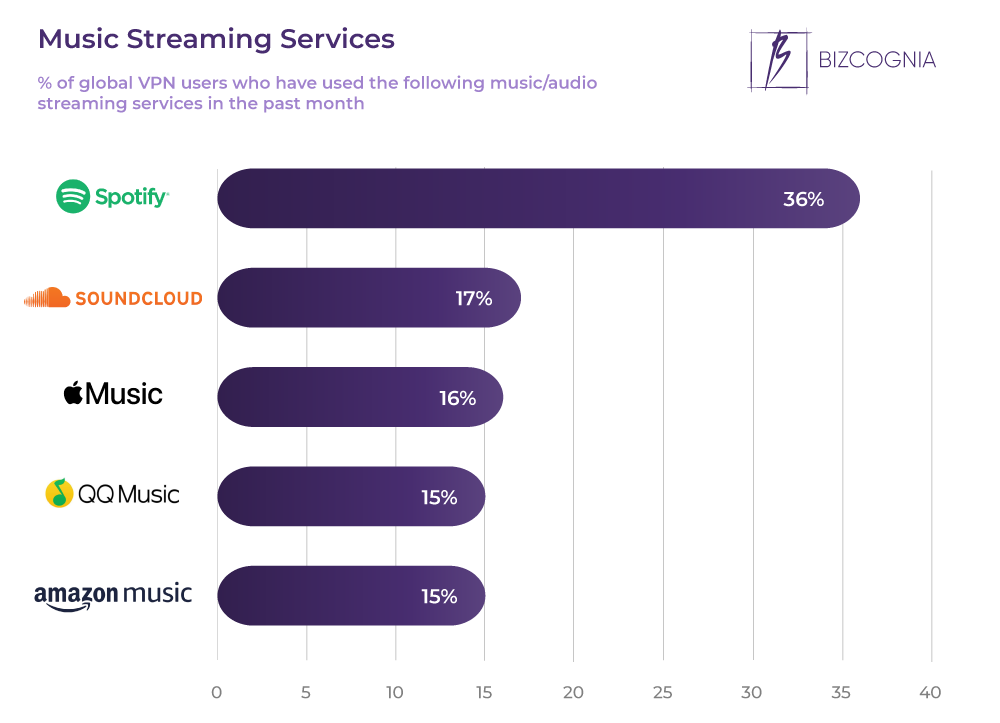
24. 91% of global VPN users own a smartphone.
Additionally, 76% own a desktop or laptop, and 42% own a tablet. Those who own a smart TV are closely behind with 41%, followed by those who own game consoles with 26%, explaining the emerging trend of solutions such as Xbox VPNs.
As per VPN statistics, equal 19% portions of global VPN users own a TV streaming stick/device and a smartwatch, followed by smart home products (16%), smart watches (14%), feature phones and eReaders (12% each) which, interestingly, create a target group of its own seeking solutions such as Kindle Fire VPNs. Another 7% of global VPN users own VR headsets/devices.
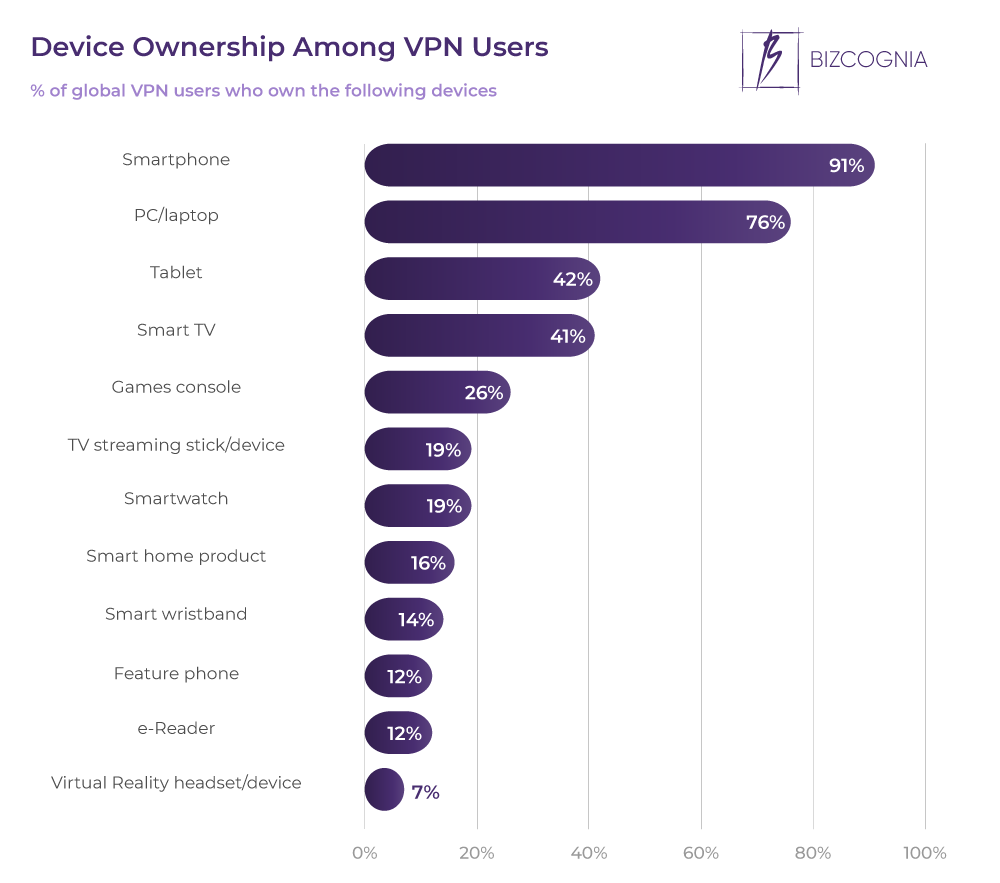
25. 81% of VPN/proxy server users use private browsing windows.
Another 75% delete their cookies, while a close 74% use ad blockers.
Among those who delete their cookies, 70% use private browsing windows, 65% use an ad blocker, and 46% use a VPN.
67% of those who use private browsing windows delete their cookies, 64% use ad blockers, and 47% use VPNs.
Of those who use ad blockers, 72% use private browsing windows, 70% delete their cookies, and 49% use a VPN.
26. 68% of VPN users say they’re constantly online.
According to VPN users statistics, another 66% say the internet makes them feel closer to people, while 64% worry about how companies use their personal data, and 62% are concerned about the internet negatively affecting their personal privacy. Another 59% prefer to be anonymous when using the internet, while 38% think technology makes life more complicated, and 27% say they don’t understand computers and new tech.
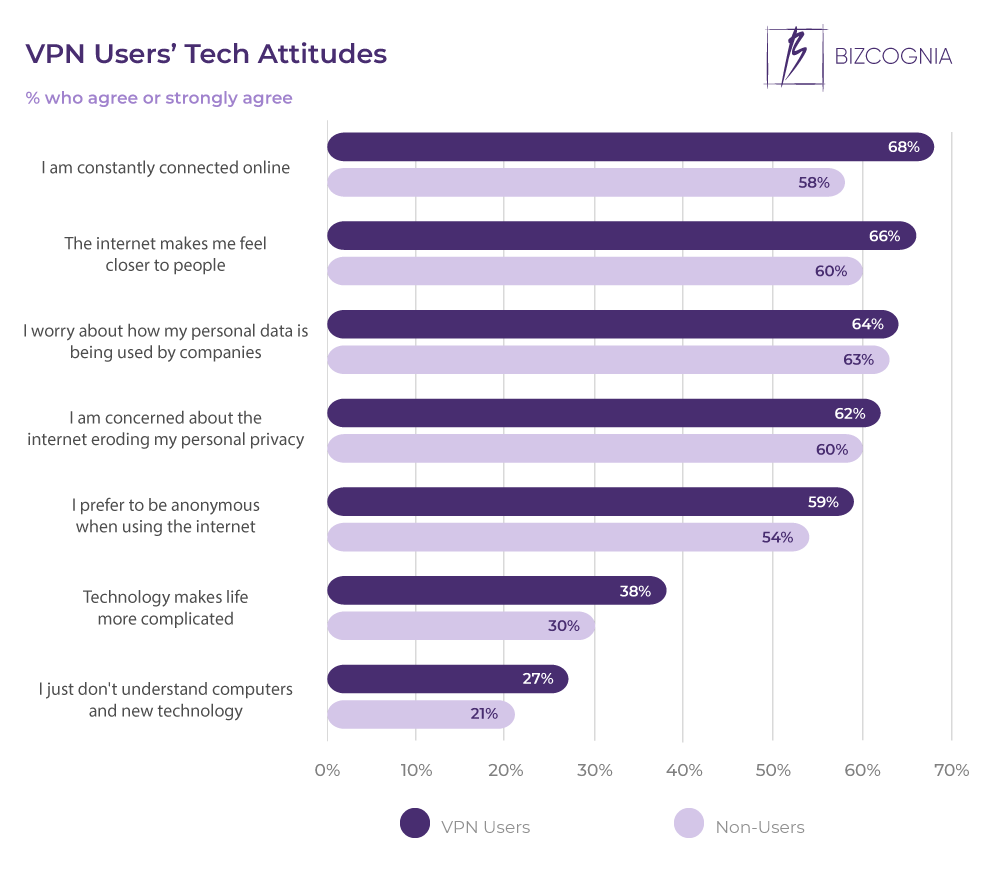
VPN FAQ
How many people use VPN?
It is estimated that 41% of adult internet users use a VPN for business or personal use.
Who uses VPN?
The dominant demographic of VPN users consists of internet users between 16 and 24, 74% of which use a VPN.
Does VPN work anywhere in the world?
As per VPN data, there are ten countries that restrict VPN usage, and those are China, Russia, Iran, the UAE, Oman, Turkey, Iraq, Turkmenistan, Belarus, and North Korea.
Why do people use a VPN?
As agreed by 55% of users, general security is the most common reason for using a VPN.
Which country uses VPN most?
Indonesia is the largest VPN market, with 55% of its internet users using one.
How many people in the United States use a VPN?
According to VPN statistics, about 22% of internet users in the US use a VPN.
Sources: TOP10VPN, Security.org, OpenVPN, GWI, CyberGhost VPN

